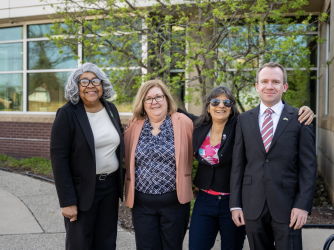Table of Contents
Michigan State Settlement Shows OCR’s Continuing Confusion about Due Process

Last week, the Department of Education’s Office for Civil Rights (OCR) issued a resolution agreement with Michigan State University following two student complaints that OCR had been investigating, the first one of which dated from 2011.
Unfortunately, despite weighing in at a hefty 42 pages, this latest finding from OCR is surprisingly light on remedies for the many due process problems that FIRE and others have seen in OCR’s work since the April 4, 2011, “Dear Colleague” letter that issued new regulations to colleges and universities on how to address sexual misconduct on campus. (These rules, as FIRE has pointed out, were not subjected to notice-and-comment provisions as required by the Administrative Procedure Act.) While OCR’s densely written missives take some time to fully digest—a problem compounded by the agency’s none-too-strict adherence to legal and regulatory custom and precedent—it’s not too soon to comment on some of the more consistent and troubling aspects of OCR’s work in this area.
The most obvious continuing problem on display in the Michigan State agreement is OCR’s continued practice of treating an accusation of sexual misconduct as similar to, or even the same as, a finding that sexual misconduct actually occurred. The conflation of these two scenarios has been a repeated problem during the last few years’ debate over what to do about sexual assault on campus, and is not confined to OCR—even the drafters of the Campus Accountability and Safety Act seem to feel that the status of victim (or survivor) and accuser are interchangeable. As all of the lawyers at FIRE learned in our first week of our required Criminal Law class, they aren’t, and the fact that lawyers at OCR (and outside groups) don’t seem to appreciate the difference is puzzling to say the least. We remain hopeful that before the dust settles, Congress will amend CASA to reflect this key distinction.
Former OCR attorney Hans Bader, who has for the last few years been at the forefront in pointing out the agency’s errors, highlights how this conflation surfaced at Michigan State in a blog entry on Liberty Unyielding. In discussing the complaint of “Student A,” who accused two students of sexual assault who were later found not responsible (even using the low “preponderance of the evidence” standard of proof), Bader writes:
On pages 40-41 of its report, OCR declares that “under the terms of” its agreement with the university, “the University will … contact Student A” and “offer” her “remedies to address any harm incurred as a result of the University’s delay in processing [her] complaints,” which might involve things like paying for counseling, providing academic assistance, or letting her retake a class she was enrolled in during that period.
Unless the problem with the delay was spoilage of evidence (that is, if there hadn’t been a delay there would have been enough evidence to find the accused responsible), it’s hard to see how these “remedies” would actually remedy any problems. But OCR discusses at length the facts of the investigation and even “conclude[s] that the preponderance of the evidence did not support a finding that Student A was subjected to unwelcome sexual conduct that created a sexually hostile environment.” How, then, would letting her retake a class be an appropriate remedy? Further, how does one make the argument that such a remedy would be required by Title IX, even if the university wanted to provide it on its own?
If a crime did not occur—and both Michigan State and OCR seem to agree that the weight of the evidence suggests that in Student A’s case, it didn’t—there is no “victim,” and therefore there can’t be a “remedy.” That’s not to say that colleges should not provide mental and academic counseling to students who make unproven accusations, just that it’s impossible to remedy an offense that didn’t occur.
While concern for both accusers and victims is laudable, pretending those two groups are interchangeable is unjust to both victims and to the accused. OCR must do better.
Recent Articles
FIRE’s award-winning Newsdesk covers the free speech news you need to stay informed.

VICTORY: Michigan town declares Sept. 6 ‘First Amendment Day’ after FIRE sues its mayor for shouting down residents

USC canceling valedictorian’s commencement speech looks like calculated censorship

Back into the FIRE: Hasen’s response to FIRE and Rohde: Don’t read the press clause out of the Constitution — First Amendment News 420
